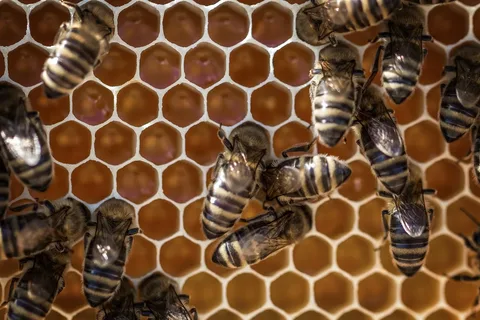Healthy honeybee colonies are the backbone of any successful apiary. However, maintaining their vitality requires more than just a sturdy hive, the best beekeeping suits, and good weather; it demands a keen understanding of honeybee nutrition and strategic feeding practices. Whether you’re a seasoned beekeeper or just starting, knowing how to feed honeybee colonies effectively—while staying protected with reliablebeekeeping veils—can significantly improve hive health and honey production.
Understanding Honeybee Nutrition
Honeybees derive their energy from two primary sources: nectar and pollen. Nectar provides carbohydrates, while pollen supplies proteins, fats, vitamins, and minerals—essential nutrients for brood development and overall colony strength.
However, natural foraging conditions aren’t always ideal. Droughts, habitat loss, and seasonal changes can lead to a lack of available resources, making supplemental feeding crucial. By understanding the basics of bee nutrition, beekeepers can better support their hives through lean periods and ensure their bees remain strong year-round.
Seasonal Feeding Strategies for Honeybees
Winter Feeding: A Lifesaving Necessity
During winter, honeybee colonies rely heavily on stored honey for survival. If their stores are insufficient, beekeepers can provide emergency sugar sources like fondant or sugar cakes. This type of seasonal feeding for honeybees ensures they have enough energy to maintain warmth and survive the cold months.
Spring and Summer Feeding: Boosting Nectar and Pollen Intake
In early spring, colonies may need a little help ramping up brood production. Providing light sugar syrup (1:1 ratio) can mimic early nectar flows, encouraging the queen to lay eggs. If natural pollen is scarce, offering pollen patties or pollen substitutes can support brood rearing until flowers bloom in abundance.
Fall Feeding: Preparing for Winter
Fall is a critical time to ensure your bees are well-nourished before winter sets in. A heavier sugar syrup (2:1 ratio) helps bees store enough reserves. Additionally, feeding nectar supplements can give them a final boost of energy as they prepare for colder months.
Organic Feeding Options for Bees
More beekeepers are turning to organic bee feeding practices to promote healthier, more natural colonies. Organic feeding focuses on minimizing synthetic additives and using natural alternatives wherever possible.
Organic Sugar Syrup
Organic cane sugar can be used to make sugar syrup free from harmful chemicals. This ensures that bees receive clean energy without the risk of pesticide contamination.
Natural Pollen Substitutes
Instead of commercial options, consider using organic pollen substitutes made from natural ingredients like brewer’s yeast and soy flour. These substitutes provide essential nutrients while aligning with organic beekeeping principles.
Nectar Supplements
Some beekeepers create nectar supplements from organic herbs such as thyme or chamomile, believed to boost bee immunity. While scientific evidence is still emerging, many beekeepers swear by these natural remedies to enhance colony resilience.
Supplemental Feeding Techniques
Supplemental feeding can help colonies during resource shortages, but it must be done carefully to avoid dependency. Using supplemental feeding for bees ensures that they have enough nutrients without compromising their natural foraging instincts.
- Pollen Substitutes: While effective, over-reliance on these can lead to nutrient imbalances. It’s best to use them only when natural pollen is scarce.
- Homemade Nectar Supplements: Beekeepers can prepare their own nectar solutions using sugar and water, adding a drop of essential oils for health benefits.
By employing these techniques strategically, you can maintain strong colonies throughout the year.
Preventing Overfeeding and Nutritional Imbalances
While feeding is essential, overfeeding can lead to problems like honeybound hives and reduced foraging activity. Balancing honeybee dietary needs involves monitoring colony health regularly.
Look out for signs of overfeeding, such as excessive syrup storage in brood frames, and adjust feeding accordingly. Maintaining a healthy balance between natural foraging and supplemental feeding will keep your bees active and self-sufficient.
Conclusion
Feeding honeybee colonies is both an art and a science. By understanding bee nutrition, implementing smart bee feeding strategies, and embracing organic feeding options for bees, you can support your colonies through every season. Using the right beekeeping tools and accessories alongside proper feeding techniques ensures that healthy, well-fed bees are more productive, resilient, and capable of weathering environmental challenges, ensuring the long-term success of your apiary.
